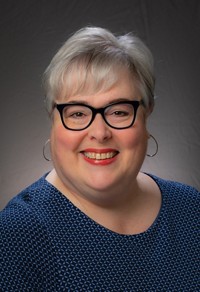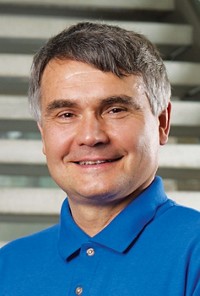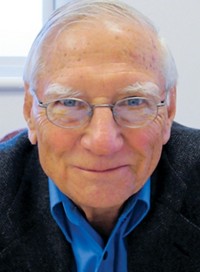Advertisement
Grab your lab coat. Let's get started
Welcome!
Welcome!
Create an account below to get 6 C&EN articles per month, receive newsletters and more - all free.
It seems this is your first time logging in online. Please enter the following information to continue.
As an ACS member you automatically get access to this site. All we need is few more details to create your reading experience.
Not you? Sign in with a different account.
Not you? Sign in with a different account.
ERROR 1
ERROR 1
ERROR 2
ERROR 2
ERROR 2
ERROR 2
ERROR 2
Password and Confirm password must match.
If you have an ACS member number, please enter it here so we can link this account to your membership. (optional)
ERROR 2
ACS values your privacy. By submitting your information, you are gaining access to C&EN and subscribing to our weekly newsletter. We use the information you provide to make your reading experience better, and we will never sell your data to third party members.
People
ACS Award In Analytical Chemistry
by Marc S. Reisch
February 11, 2013
| A version of this story appeared in
Volume 91, Issue 6

Sponsored by Battelle Memorial Institute
Isiah M. Warner has made significant contributions in three areas of analytical chemistry: molecular spectroscopy, separation, and novel nanomaterials.
Warner, 66, Philip W. West Professor of Chemistry at Louisiana State University (LSU), is among the leading experts in analytical fluorescence spectroscopy and has employed multidimensional fluorescence techniques to unravel complex systems. For example, he demonstrated that fluorescence-detected circular dichroism could be used to selectively monitor chiral molecules.
Warner and his group have also made significant contributions to studies of organized molecules, such as micelles, in spectroscopy and separations. His group demonstrated the first noncovalently linked trans-stilbene excimer in fluid solution using a system incorporating molecules of cyclodextrin, stilbene, and cyclohexane.
More recently, Warner has developed novel nanomaterials from a group of materials with uniform properties and compositions based on organic salts, which are primarily frozen ionic liquids with melting points of up to 250 °C. The work marks a simple approach to the production of nanomaterials for analytical use.
Warner’s seminal contributions to analytical chemistry began early in his life. As a graduate student at the University of Washington (UW), in Seattle, he initiated development of rapid-scanning excitation-emission matrix fluorescence techniques, notes one of his colleagues. Warner is “a great scientist, teacher, mentor, and administrative leader,” the colleague adds.
In addition, Warner’s “deeply intellectual work has provided the mechanistic insight for the development of better chiral selectors for separations and sensors,” according to another colleague. In her estimation, one of Warner’s greatest achievements is “his creative use of fluorescence anisotropy for unraveling chiral interactions that give rise to chemical separations.”
Warner, who is also a Boyd Professor of the LSU system, vice chancellor for strategic initiatives, and a Howard Hughes Medical Institute professor at LSU, received a B.S. in chemistry from Southern University & A&M College in Baton Rouge, La., in 1968. He worked for five years at Battelle Memorial Institute before earning a Ph.D. in chemistry from UW in 1977.
Warner’s first academic position was at Texas A&M University, where he received tenure. He then served on the chemistry faculty of Emory University beginning in 1982, becoming a Samuel Candler Dobbs Professor. He joined LSU in 1992 and served as department chair from 1994 to 1997. He has overseen more than 50 doctoral dissertations and seven master’s theses, as well as mentored hundreds of undergraduates, encouraging them to pursue degrees in the sciences.
He has published more than 300 refereed manuscripts and has served on a number of National Academies committees, including as chair of the National Research Council Board on Assessment of the Chemical Science & Technology Laboratory in 1995. He has received awards including the ACS Award for Encouraging Disadvantaged Students into Careers in the Chemical Sciences in 2003 and the ACS Division of Analytical Chemistry Award in Spectrochemical Analysis in 2008.
An ACS member, Warner was inducted into the inaugural class of ACS Fellows and chaired the society’s Division of Analytical Chemistry in 2009. He is also a member of the National Organization for the Professional Advancement of Black Chemists & Chemical Engineers.
Warner will present the award address before the ACS Division of Analytical Chemistry.





Join the conversation
Contact the reporter
Submit a Letter to the Editor for publication
Engage with us on Twitter